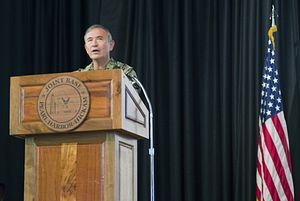Commenting on U.S.-Asia policy in the Donald Trump era, I’ve gotten somewhat used to seeing strange diplomatic requests, at least from the U.S. side. (See Trump’s recent demand for South Korea to cough up $1 billion for a missile defense system or his earlier threat to renege on a refugee agreement with Australia.) Indeed, this tendency for the United States to now put everything up for bargaining is seen as a hallmark of Trump’s deal-making style — by both his critics and supporters.
It turns out, though, that deal-making cuts both ways. If U.S. adversaries and allies perceive that the Trump administration is willing to entertain any offer, they may look to test the limits of what is truly up for sale. An eye-popping headline from Japan’s Kyodo news agency — “China urged U.S. to fire Pacific Command chief Harris in return for pressure on North Korea” — made this clear over the weekend. Sourced on a single person “close to U.S.-China ties,” the article suggests that “Chinese leadership” directed Cui Tiankai, the country’s envoy in the United States, to convey the request to the White House. In exchange, China offered to agree to exert more pressure on North Korea.
This report is truly remarkable and, if true, marks what is an unprecedented diplomatic request from the Chinese side in U.S.-China ties in recent memory. Of course, China’s distaste for U.S. Pacific Command’s Admiral Harry Harris is well-known; Harris, as an ardent proponent of muscular challenges to Chinese maritime irredentism in the East and South China Seas, has earned his fair share of criticism from Chinese commentators. (Harris’ first visit to China in his role as PACOM commander came just days after the Obama administration’s first South China Sea freedom of navigation operation.)
In the end, Harris hasn’t been fired yet and the veracity of the Kyodo account remains uncertain, but the episode, if true, would mark an important case study in the damaging nature of Trump’s issue-agnostic approach to deal-making and willingness to draw linkages across various issues bedeviling the U.S.-China relationship. Consider that Trump has offered China better terms on bilateral trade in exchange for cooperation on North Korea, linking the economic and strategic agenda like never before.
Consider also that Trump has suggested that he would not accept a phone call from Taiwanese President Tsai Ing-wen without consulting first with President Xi Jinping. “He’s a friend of mine… I think he’s doing an amazing job as a leader, and I wouldn’t want to do anything that comes in the way of that. So, I would certainly want to speak to him first,” Trump said, when asked about the possibility of another interaction with the Taiwanese president. For anyone who held on to the notion that Trump truly cared about 23 million Taiwanese citizens and their democracy after the December phone call with Tsai during the transition, this was an unwelcome wake-up call that the island would more likely than not just end up as another bargaining chip in U.S.-China ties.
Given these explicit statements by the U.S. president, why wouldn’t China aim to probe what previously unthinkable concessions it could extract in return? Clearly, by prioritizing the North Korea issue above all else, Trump has handed Beijing a great deal of leverage over the full gamut of the U.S.-China relationship. Furthermore, reading the above in light of recent reports noting that the administration has rejected PACOM requests for additional freedom of navigation operations (FONOPs) suggests that the administration simply is unable to walk and chew gum on U.S.-China ties.
In the interest of making progress on the North Korea problem, where Trump has long believed — mistakenly — that China holds the key to a solution, Washington has ceded the initiative in other areas to Beijing. (The Obama administration too rebuffed PACOM’s push for additional FONOPs, but did not explicitly let on that a single issue, like North Korea, would moderate U.S. action in other areas of the bilateral relationship.)
While I remain skeptical that the Kyodo account of Cui’s request regarding Harris went down as described, it’s not unreasonable that China will look to make the most of Trump’s propensity to draw linkages across issues in the interest of deal-making. For now, the United States seems satisfied with China’s position on the North Korea issue in the aftermath of the Mar-a-Lago Summit. Beijing will no doubt aim to keep the Trump administration reasonably happy with its actions on North Korea, hoping to disincentivize Washington from authorizing additional South China Sea FONOPs, undertaking a major arms sale to Taiwan, or even souring the bilateral trade relationship.
The sooner this administration figures this out, the better.

































